- Home
- Brian Hodge
Prototype Page 17
Prototype Read online
Page 17
"I forgot," she mumbled with apology, creamy brow furrowed.
He nodded but didn't believe her. She was just testing to see if anything had changed while he'd been away, been cured, if anything in him had inched closer to her view of the way normal people behaved. He was sorry to disappoint. He had just never liked being touched, unless something more animal was sure to come of it. Sex, or fighting — probably both qualified, and weren't even so different. Both involved tearing into someone else. Touching for its own sake was like making a promise that would eventually have to be broken.
"Graham's being sweet tonight, have you noticed?" she said.
"Maybe he remembered to take his Prozac."
"Clay!" she bawled, half-laughing, half-chastising. He did like to make her laugh, on the rare occasions he actually managed. Nina was the sort who looked as if she needed to laugh more, even deserved to. Laughter was kind to her, erasing the damage and hurt accrued just by being alive.
Sometimes he had to wonder why she and Uncle Twitch hung out with the rest of them. They were too optimistic, too kind. They would be cannibalized someday.
"Why shouldn't he be sweet?" said Clay. "He has admirers and he didn't have to do anything to get them over here. He gets to maintain his front."
"Well," Nina shifted her rounded shoulders, a tacit agreement, "you know how he can be. I worry about him sometimes. While you were gone? A couple weeks went by that nobody saw him, not even Erin. I thought maybe he went out on your trail."
"Erin didn't mention that." He shrugged. "He was probably just locked in here working the entire time. Have you seen that new painting?"
"It's not good for him to be that alone, he's not like you. Graham thinks he doesn't need other people, but he does." Nina's eyes were wide and she nodded, an innocent sage.
"Mostly to try to salvage his own ego."
"That's still needing them."
He smiled at her, could not help it. Saint Nina. He wondered how she discussed him behind his back, what kind things she would find to say that, if he heard them, would make him blush or gag, knowing them to be revisionist varnish. When I die, he would get around to telling her someday, you write the obituary.
Clay got up, had to move. Drifted about the maze of the basement apartment, the half walls and squared brick pillars that came down to anchor the house above, and made Graham's home seem smaller than it really was, more complex. In one far corner was a door to a big storage room. When Clay passed it he noticed a faint odor lingering about the corner. He put his nose to the door crack and sniffed — stronger, an old after-scent like brimstone, fires recently burned in the hearts of iron forges.
He opened the door and the scent rolled out of the black. Nothing inside that he could see but a mere shape, massive and still, like a boulder carved raggedly square by ancient Mayan hands, then shrouded in pale drop cloths —
And then a hand, this one flesh and blood, splayed on the door to push it out of his grasp, to close it.
"No," Graham said. "I meant to get a padlock for that door."
"What's in there?"
"No, no. No. Don't ask me about it." Graham twisted in place, looking painfully at the floor for a moment, leaving his hand on the door. "It's not ready yet."
"A sculpture?" But surely not, Graham had never before worked on anything approaching such a scale, nothing he could not set upon a tabletop with ease. Although clearly he had taken some leap with that new painting, upgrading his obsessions into grander dimensions.
"I told you not to ask me." Something burned in Graham's eyes, those dark eyes alight and saying, I'm in control, I know what I'm doing, that look approaching pure transcendence just before someone tries to fly out a window.
"Sorry," Clay said, and it was Graham again, the Graham he had always known. Always? As much always as you could fit into four years.
"You feel like going out?" Graham asked. "Sarah wants to go to The Foundry. Sounds good to me, I'm sick of this place."
Clay said sure, The Foundry, anytime, knowing he had lost his one and only chance for a sneak preview. Graham would have a lock on the door by the time he was here again. Graham kept promises. He was funny that way.
Eighteen
Why was the question Adrienne kept coming back to about Clay and the other dozen. What spotty knowledge she had of genetics had been picked up just since Clay's karyotype had been run, but it simply did not seem feasible that Helverson's syndrome could have remained undetected until six years ago, not when karyotypes had been run since 1956. Were it that rare, it seemed statistically unlikely that thirteen subjects would then be found in just six years, had this mutation been in the gene pool for centuries.
But suppose it were a more recent mutation, spontaneously arising within the last generation or two?
Such dramatically swift changes were not impossible. The higher incidence of hypertension among black Americans was now thought to trace back to the days of slavery, when the bodies of Africans in oceanic transit — chained below deck for weeks in sweltering holds and denied adequate water — quickly learned to retain vital salts rather than sweat them out. A swiftly adapted biological survival mechanism that, ironically, was now impairing lives rather than sustaining them.
But again, Helverson's: Why? What possible function could it serve? She could not, in good conscience, consider it an illness.
While a gross mutation, it was not a debilitating condition on par with Down's and Wolf-Hirschborn syndromes. There was no developmental abnormality as with any of several misprints affecting the sex chromosomes. So far as she could discern, Helverson's syndrome manifested itself — aside from benign facial-structure similarities, and such frequently reported quirks as resistance to sedatives and alcohol intolerance — in emotional and psychological affect. But detrimentally so: Its carriers seemed ill-equipped to contend with standard human stresses and interactions. If there was a common thread running through the dozen case studies, and now Clay's life, this was it.
Experience can override biology, she had assured him, but here the data challenged that precept. Among the thirteen, there was not a single exception to what looked to be a depressing rule.
All along she had wanted to believe that, as in countless other behavioral disturbances, genetics may have played a factor in predisposing someone to certain tendencies, but whether or not these were manifested was due to upbringing and environmental conditions. An authoritarian father, an abusive mother, a loveless home … one or more trigger mechanisms. A room packed with gunpowder may sit calmly for a lifetime, as long as it’s never introduced to a spark.
While she could not know everything about the first dozen, their backgrounds seemed to transcend even those broad criteria. One of the Americans, a twenty-seven-year-old named Timothy Van der Leun, whose home was listed as Indianapolis, was the son of a Lutheran minister whose family had cooperated fully in research, and had been found to be quite loving and healthy. Yet Van der Leun's life had been plagued by much the same turmoil as the rest.
While thirteen made a tiny research population by most lab standards, it was nevertheless difficult not to make sweeping conclusions based on available evidence. That extra chromosome did something to them. It heightened aggression and curtailed more tender emotions. It turned them into outsiders, adrift in societies for which they had more contempt than love.
What a find it would be if one were located whose life had taken a placid course. It would belie everything she was thinking while trying so hard not to. It would bury the notion that the stigma surrounding Helverson's was pure biological determinism. It would prove they were not prisoners of a rogue chromosome.
For that matter, what a find it would be if one were located who was female. More statistical unease.
If she allowed her intuitive right brain to leapfrog ahead of its logical left counterpart, it would almost appear as if something were deliberately guiding this. Some bored god shuffling molecular parts in a new configuration — there, let's see h
ow this works.
She was big on theory, conjecture. Dutifully, she logged her evaluations of Clay in her notebook computer. She composed weekly reports and uploaded them to the mainframe at Arizona Associated Labs. She sought weekly feedback from Ferris Mendenhall, a link to the structure of Ward Five, almost distrusting his opinion that she was handling the case as well as could be expected from anyone.
She told them all how Clay professed to be more at ease with the world since having a trusted therapist to talk with, and they all found that of interest. She was just waiting for them to tell her to cut him off, therapeutically speaking; see if he reverted.
At his next Wednesday session, following Sarah's introduction to the others at Graham's, he was in fine form, low-key, and she gently worked her way around to a discussion of the possibility of a spontaneous mutation that had some as yet unexplainable reason behind it. Thinking this may be a good way, after another session or two, to reveal the existence of the others. Perhaps he would be strong enough now to handle the fact of them, their lives. Their sad lives.
She found his response to today encouraging, Clay as intrigued as if this were an evolutionary mystery to be solved, and he a smoking gun.
Her only real fear was ethical: In getting Clay to consider the possibility of some process at work here, rather than a random fluke, was she overstepping her bounds of authority? Dabbling in lines of thought for which she was unqualified?
No, that's the problem with science, there are too many delineations, she told herself in rebuttal. Too many specialists who can't let themselves see beyond their specialty. Too many experts dividing the material body from immaterial consciousness.
Western medicine was only recently beginning to admit what Eastern physicians had known for thousands of years: All things are one, connected, interdependent.
And most times she thought she would rather be boldly wrong than so narrowly timid she dared never stick her neck out.
The only drawback: You could never know how wrong you might be.
*
He came over Thursday afternoon, unexpected, unannounced, and, once she got a good look into his eyes, unbalanced. Clay stormed past her with a sheaf of papers clutched in one fist, trembling as he bristled from the core.
"Don't lie to me," he said, voice a raw crack of air. "I'll smell it from you this time."
She could feel it instantly, that same cold squeeze of her heart she'd known that day in her office when Clay had experienced a minor breakthrough, trembling with furies she did not wholly trust him to contain. He had become that Clay all over again, Clay at the breaking point, an atavism with the smell of the city wafting from his clothes.
Adrienne was acutely aware of the door at her back, how alone she was, Sarah off with Nina, doing Nina things, the two of them new friends, Nina probably asking for lessons, Teach me how to be a lesbian.
She shut the door, could not run now. She had expected this to be a smooth process? Setbacks were inevitable.
"Tell me what's wrong," she said.
"You held back from me. You held back information from me!"
Frowning, Adrienne stepped forward, inner alarms giving way to curiosity.
"Tell me if these places strike you as having anything in common." He could not stand still, pacing with the frightening deliberate monotony of a lion in a cage, back and forth between the sofa and the open bar that bordered the kitchen. "Los Angeles, Texas — death row no less — Indianapolis."
Her breath lodged in her throat.
"Seattle, let's see, that's it for this country, umm, oh yeah, Canada's got one."
One question huge, echoing: How had this happened?
"Two for Japan, the little fuckers probably build cars that blow up on impact" — wheeling on her then, screaming into her face — "Have you figured out yet what I'm talking about?"
Everything she had accomplished with him, the distances she had brought him in two months — Adrienne could sense them slipping away. Any danger from Clay was forgotten as soon as she recognized the hurt stamped upon every feature of his face. The ache, the sense of betrayal. The loathing. This must be the feeling of pulling someone to the brink of safety from a flood, and just as they rise cold and shivering from the murky depths, seeing them disappear once more, traceless in an eye blink, no second chances.
How? How?
Sarah? Could Sarah have copied some of this information and given it to him? Would she have? Surely not.
"All right, Clay, listen to me." She strove for reasoned calm that she did not possess. "I understand that you must feel — "
"No! No, you don't! I used to think you might, but you don't understand or you wouldn't have let me find out this way!" One arm trembled in the air, then he snatched up a cereal box from the bar — Sarah's breakfast — and hurled it across the kitchen. It struck the corner of the range hood, bursting like a boil, cereal showering across the stovetop and counter and floor. "There's twelve more and they're just like I am, they're all this way!"
She made herself take one more step in his direction. "Clay, show me what you're holding."
He threw them at her, most of the pages staying together in a sheaf that struck her full in the face. She started backward, more in surprise than anything; an unaccountable shame, like a slap in the face. When she rubbed a tingling spot at the outer corner of one eye her finger came back with a spot of blood, seeping from a tiny paper cut. It was an awakening — he might really do her harm.
"Calm down, Clay," speaking firmly, with neither anger nor trembling. "I do realize you're upset about this… " On and on, empathetic, soothing. She stooped to gather the stray pages, scanned them quickly, found them to be photocopies of the introductory overviews from each of the prior twelve case studies.
Adrienne looked up and saw him glaring, at last rooted to one spot. Not knowing if it was good or bad.
"Where did these come from?"
"I got them in the mail."
"And there was nothing else with them?"
He jabbed a finger toward the papers. "You haven't gotten to it yet."
She shuffled until she found it. The note posed only more questions; a skimpy cover letter, a single sentence typed near the top of a sheet of plain white paper: In case they haven't already told you, you're not alone in the world. There was no signature.
She was at a complete loss to explain this, the sort of thing that might be laughed off as a cruel joke were the information not available to such an exclusive few, all of whom should know better than to tamper with someone with such a vulnerable — and volatile — state of mind.
"Did you bring the envelope this came in?"
"No." His laboring breath seemed very loud to her; even his lungs sounded stressed. "No return address, if that's what you're wondering. The mailing label was typed. It was postmarked from Boston."
The city in which Helverson's had been discovered. The name of the lab escaped her at the moment, though she could not believe anyone there would perform such a grossly negligent stunt. People got hurt this way, someone learning too much, too soon.
"Why didn't you tell me?" he asked.
"I know you're feeling betrayed," she said. Trying to imagine such an all-inclusive betrayal: his family, the world, nature itself. And now me. "You may not believe me, but I hope you do. I was about ready to tell you, after another session or two. It wasn't a question of keeping this a secret from you, Clay. Never that. I was waiting until I felt the time was right — that you'd been stable enough, for long enough, that you could handle the news." Better than you're handling it now.
"Good idea!" he screamed. "Great fucking idea, wait and let somebody else do it, everybody knows except me, everybody but the mutant!"
For two months she had watched him wage his battles, those intensely private wars with himself, with his impulses, with fears and memories and truths. She had seen him emerge with victories, draw stalemates, and while he had at times been bested, always, always, she had believed he would in t
he end win out. Part of it was faith in Clay, the rest faith in her own dedication.
There could be no greater heartbreak, then, than to realize she may have been deluded. He might actually lose, helpless to save himself, she powerless to prevent it.
Clay grabbed one of the round-topped stools sitting at the bar, upended it so that he held it by the ends of two legs.
"They just decide they want to push my buttons" — he brought the stool crashing down against the bar — "see if that fucks me over too" — the stool's heavy wooden framework cracked apart, and he battered it down again, again — "this is just another experiment" — shrapnel and splinters rained, and the cushioned seat flew in a wobbly arc to slam against the far kitchen wall — "so you go back and tell them it worked! Adrienne!"
As the stool had broken apart, he'd been left with a little less in hand for the next downswing. She had moved neither to stop him nor to flee, for if old theories were correct, property destruction was a safety valve to keep him from committing assault. The bar now scarred, his surrogate Adrienne, perhaps. Or a stand-in for everyone he remembered poking and prodding his body and mind. He will not strike me, he will not strike me, he will not strike me.
He finally stopped, pieces of the stool scattered over ten-foot radius. Clay flung the last flimsy shards to the floor, then turned on her, breath heavy upon her face, furnace-hot and feral, the breath of a lion.
"Give me that," he said through clenched teeth, and tore the papers from her nerveless fingers.
To the door.
From outside herself, she watched Clay's stride and her own after him, mentally fumbling in her inimitable way with the proper things to say, out of textbooks and lectures and experience. All had fled; just as well. They would serve her no better than muteness.
"Stay out of my head," he told her, and didn’t look back.

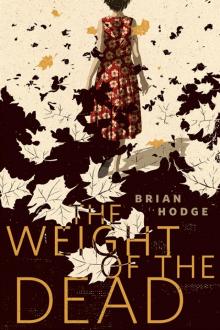 The Weight of the Dead
The Weight of the Dead Lies & Ugliness
Lies & Ugliness The Convulsion Factory
The Convulsion Factory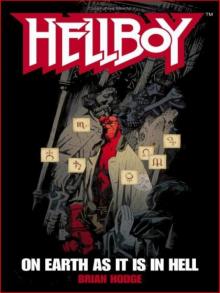 Hellboy: On Earth as It Is in Hell
Hellboy: On Earth as It Is in Hell Whom the Gods Would Destroy
Whom the Gods Would Destroy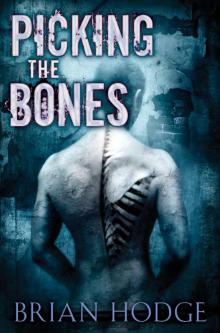 Picking the Bones
Picking the Bones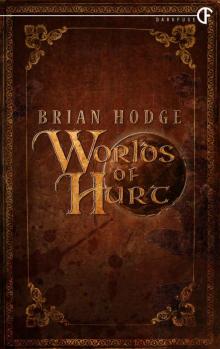 Worlds of Hurt
Worlds of Hurt Oasis
Oasis Nightlife
Nightlife The Darker Saints
The Darker Saints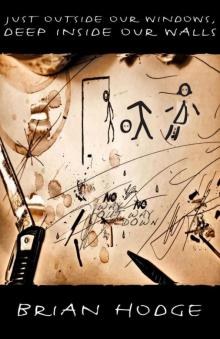 Just Outside Our Windows, Deep Inside Our Walls
Just Outside Our Windows, Deep Inside Our Walls A Haunting of Horrors, Volume 2: A Twenty-Book eBook Bundle of Horror and the Occult
A Haunting of Horrors, Volume 2: A Twenty-Book eBook Bundle of Horror and the Occult Dark Advent
Dark Advent Mad Dogs
Mad Dogs Prototype
Prototype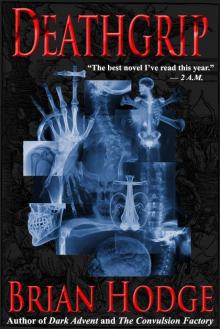 Deathgrip
Deathgrip Falling Idols
Falling Idols